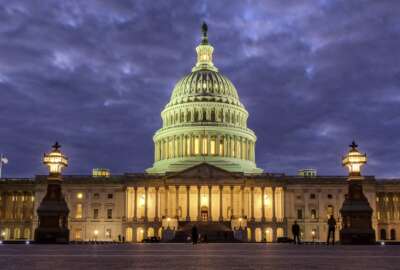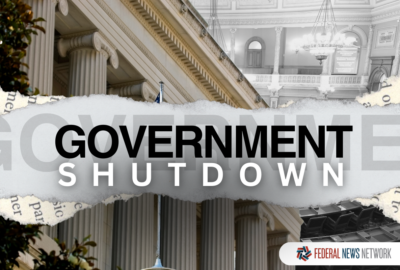Feds’ GoFundMe campaigns open a ‘minefield’ of ethical questions during shutdown
Absent specific guidance on the matter, federal employees walk a tricky line in accepting furlough donations and complying with existing ethics rules.
Best listening experience is on Chrome, Firefox or Safari. Subscribe to Federal Drive’s daily audio interviews on Apple Podcasts or PodcastOne.
As the government approaches 18 days and counting, dozens of people describing themselves as federal employees are soliciting donations on “GoFundMe” pages to ease the financial uncertainty ahead of likely missed paychecks.
But absent specific guidance from the Office of Government Ethics on this matter, federal employees walk a tricky line in accepting furlough donations and complying with existing ethics rules.
OGE Director Emory Rounds directed agencies on the day of the shutdown to remind their employees “that they remain employees of the federal government during furlough periods.” Standard ethics laws and regulations still apply. Some individual agencies have disseminated their own ethics guidance ahead of the government shutdown.
But existing ethics rules open up a “minefield” of questions about how federal employees can solicit donations during shutdown furloughs, if at all, said Virginia Canter, chief ethics counsel for the Citizens for Responsibility and Ethics in Washington organization. Canter previously served as White House associate counsel during the Obama and Clinton administrations and led the Treasury Department’s ethics office.
On one hand, current ethics rules prohibit federal employees from accepting a gift valued at $20 or more. Employees can’t accept gifts from the same person that total $50 or more during the same calendar year, according to OGE guidance.
“Those are gifts,” Dan Meyer, a partner at the law firm Tully Rinckey, said. “A GoFundMe [donation] is a gift. You have to declare your gifts. There’s a process through the ethics officer at every agency to declare where your gifts are coming from. You have to pay your taxes on your gifts, obviously. Those gifts cannot come from certain individuals.”
Typically, federal employees can’t accept gifts from “prohibited sources,” or organizations that do business with the employee’s agency.
With that in mind, federal employees soliciting shutdown donations would need to ensure the source of every contribution.
“You would have to be able to determine whether or not the [people] who are offering the donation [have] business before your agency, and you’d have to be able to screen that,” Canter said.
In addition, federal employees “can never use his or her position or any authority associated with public office to solicit or coerce the offering of a gift,” according to OGE ethics guidance.
On one hand, an ethics officer could interpret existing guidance to determine that no federal employee could describe himself as a federal worker impacted by the government shutdown to solicit donations.
Or it could mean that federal employees simply need to get creative in how they appeal for help, Canter said. Rather than mentioning a specific agency, an employee could describe himself as a “person impacted by the government furlough.”
“They may not be able to use their individual position. Maybe it’s okay for a family member to say I am affected by the government furlough and [am] seeking possible donations,” Canter said. “They have to come up with the appropriate language that will allow them to avail themselves.”
The Office of Government Ethics doesn’t have guidance on how federal employees can use online donation platforms to bridge the financial gap between paychecks during the government shutdown — if at all.
For Canter, it’s past time for OGE to issue specific guidance on the matter.
“I would urge the Office of Government Ethics to put out general guidance on this,” she said. “It’s not sufficient to say you have to comply with the ethics laws and regulations but not give common sense guidance about what would be permissible in the context of GoFundMe. There are going to be federal employees who are not just living paycheck to paycheck but day-to-day who are going to have to feed their children. It’s unrealistic to assume that they’re not going to need very definitive ethics guidance on this.”
Volunteering during a government shutdown
Federal News Network has gotten questions from furloughed readers who are looking for volunteer opportunities or other ways to spend their down time during the partial government shutdown.
But well-meaning federal employees should be careful about where they volunteer. Furloughed employees can volunteer for any non-federal organization without much problem, Meyer said.
But Interior Department employees might want to avoid picking up trash at their local national parks.
“For the vast majority of federal employees, if they want to go and volunteer for a non-profit or work or their church or a school, that’s not a problem,” he said. “They don’t have to get prior approval for that. I would be very concerned about any federal employee volunteering in a way that completes the federal mission unless they have some email notice from their general counsel saying it’s okay.”
Canter, however, sees the situation slightly differently. Typically, most agencies can’t accept volunteer services during a lapse in appropriations. Agencies should specify whether they can accept volunteer work — including services from federal employees — in special circumstances like a government shutdown.
Canter said she doesn’t see a problem with employees volunteering at a national park, for example, if the employee is working as a member of the public, not a federal worker.
But for Meyer, all it takes is an observant employee to see local news footage of their co-worker working at a national park during the shutdown and raise questions with the agency’s ethics office or inspector general.
“On an agency table of penalties, this could be anything from a letter of reprimand to two or three, or maybe even five days, suspension,” he said of the potential ethics violations.
The same rules apply for federal employees who are looking for a second job or part-time work during a government shutdown as they would during any other time of the year.
“You have to vet the identity of that employer back with your agency ethics officer, which is usually in a shutdown the general counsel,” Meyer said. “The general counsel is essential and should be working away.”
Poor timing complicates ethics questions
The timing of this particular government shutdown certainly adds another layer of complexity to federal employees’ ethics questions.
With the partial shutdown starting on Dec. 22 before the Christmas holiday, agencies may not have had time to brief their employees in as much detail as they did during the 2013 lapse in appropriations, Meyer said. The 2013 shutdown ran from Oct. 1 through 17.
While most agency general counsels are considered “excepted,” most ethics officers are likely furloughed.
And at the same time, sites like GoFundMe and the ever-evolving social media space is creating more opportunities for federal employees — and more uncharted territory for government ethics officers.
“It makes somebody running afoul of the ethics rules much more likely, because we have things like GoFundMe and other sites that are available now that might not have been available in … past [shutdowns],” Canter said.
Copyright © 2025 Federal News Network. All rights reserved. This website is not intended for users located within the European Economic Area.
Nicole Ogrysko is a reporter for Federal News Network focusing on the federal workforce and federal pay and benefits.
Follow @nogryskoWFED






